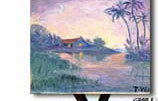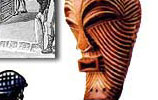English Department, SOCE
 |
Kate Liu, Spring 2001
|
-- How do we read a text? (Here a "text" is not limited to literature, nor to "books": we ourselves can be texts, too.) How do we produce more than one interpretations of it? How do we hold a dialogue with it or challenge it?From these questions, you can tell that this is not a course designed for passive reading of long texts. The theoretic texts may be short but difficult. But with the reading/watching of literary and cultural examples, we will be actively engaged in thinking, analyzing, questioning and criticizing what we have read and, by extension, ourselves and our society.-- What does an author actually express in his/her work? What is "the unsaid" of the text?
--How are the meanings of a text controlled by society? Can a text transcend its society and retain universal values throughout history?
![]()
In other words, the course is designed for you to interpret and analyze literature from various perspectives so that you can understand and analyze both literature and you yourselves more. Of the approaches we will cover thissemester--formalism, feminism, marxism, and, if possible, reader response--you will find that formalism is not really something new to you (practiced in a lot of literature courses, e.g. introduction to literature). But it will be used as a basic training of our ability to grasp a literary work as a complicated but coherent whole.Texts to analyze:
We will use literary texts as our focus, but also some films, music videos, popular songs and animations will also be used as supplements.Textbook:
文學批評讀本 (劉紀雯編﹚。Reference books: (a detailed list, with intro. to each book
A。初級文學批評導論 (不介紹理論):
Beginning Literary Criticism (文學批評入門) Holstein, Michael. Taipei: Bookman, 1987.
Practical Criticism. Peck/Coyle. Macmillan.
Ways of Reading: Advanced reading skills for students of English literature. Martin Montgomery, et al. NY: Routledge, 1992.
Practicing Theory and Reading Literature (Raman Seldon. Kentucky, 89)
B。中級文學批評導論 (含理論):
A Handbook of Critical Approaches to Literature (W. Guerin, et al. 3rd ed. Oxford, 92)
Critical Theory & Practice: A Coursebook (Keith Green & Jill Lebihan. Routledge, 96)
Literary Criticism: An Introduction to Theory and Practice. (Bressler, Charles E. 2nd Ed. Englewood Cliffs, New Jersey: Prentice Hall, 2000.
Literary Theory : A Practical Introduction Michael Ryan. MA: Blackwell, 1999.
C。參考書(guide, dictionary, topic discussions)
Doing English: A Guide for Literature Students. Robert Eaglestone. NY: Routledge,
2000.Reader's Guide to Contemporary Theory (Raman Seldon. Harvester, 93)
Eagleton, Terry. 《文學理論導讀》.吳新發譯. 台北:書林,1993.
Lentricia, Frank, et al eds. 《文學批評術語》. 張京媛等譯. 香港:牛津大學.
Columbia Dictionary of Modern Literary and Cultural Criticism. Ed. Joseph Childers and Gary Hentzi. NY: Columbia UP, 1995.

Besides the texts included in our reader, you can choose from the following list: